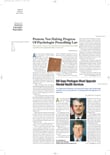It may come as no surprise that substance abuse is common among the homeless population. A 1997 study conducted in Alameda County, Calif., found that such abuse was eight times more prevalent among homeless people than among the general population.
Yet even if substance abuse is widespread among homeless individuals, much less is known about the relationship between homelessness and substance abuse. So Thomas O'Toole, M.D., of the Johns Hopkins University School of Medicine, and colleagues conducted a study to explore this relationship.
One of the interesting pieces of information they uncovered—and one that surprised them—is that substance abuse may not necessarily increase after people become homeless; in fact, it may even decrease.
O'Toole and his coworkers surveyed more than 500 homeless adults at 91 sites in Pittsburgh and Philadelphia, and in such diverse settings as emergency shelters, congregated eating facilities, abandoned cars, and park benches. After completing the interview, each participant in the survey received $5 in cash or the equivalent in bus tokens and a listing of area health and social service providers. To create a more comfortable environment for respondents to answer questions truthfully, formerly homeless research assistants conducted the interviews.
The researchers used a version of the National Technical Center Telephone Substance Dependence Needs Assessment Questionnaire, modified for face-to-face interviews and with questions specific to homelessness added. The questionnaire included questions about demographic characteristics, past and current alcohol and drug use, medical and mental health comorbidities, prior substance abuse–related treatments, means of acquiring drugs, interactions with the criminal justice system, and an assessment of current health and social services needs.
Some 78 percent of the survey respondents, the researchers reported in the May American Journal of Public Health, met DSM-III-R criteria for substance abuse, dependence on alcohol or drugs, or a combination of both. Alcohol, cocaine, and heroin were the most commonly reported substances of abuse, with alcohol being the most commonly misused substance both individually and in combination with other substances.
Of the 78 percent of survey respondents with a substance abuse problem, 30 percent reported using more substances after becoming homeless, and 70 percent reported using the same amount of substances, or even less, after becoming homeless. This finding surprised the investigators; they had expected that becoming homeless would generally lead to more drug and alcohol use.
If what the 70 percent of respondents reported was accurate—that they were not just telling interviewers what they believed the interviewers wanted to hear—why might they have used the same amount of substances, or even less, after becoming homeless? Fifty-one percent of the 70 percent who said that they were using the same amount of substances, or even less, said that the reason was because they were in recovery, whereas 22 percent of the 70 percent said that the reason was that they were no longer able to afford substances now that they were homeless.
An increase in substance use after becoming homeless appeared to be in response to the person's experiencing mental health symptoms such as anxiety or depression or to living in a homeless environment. Surges in substance use after becoming homeless were noted more commonly with alcohol than with other substances. Panhandling, selling plasma to support one's addiction, and not having health insurance were found to be independently associated with more substance use after becoming homeless.
These results have some practical implications, the researchers believe. For instance, “for those who reported an increase in their substance use after they became homeless, the increase often was in response to self-reported mental health symptoms,” stated the researchers in their study report. “This apparent self-medication highlights the co-occurrence of mental health issues with substance abuse among homeless persons and the need for dual-diagnosis-specific and other integrated care approaches.”
Also, although a number of homeless persons may be receiving drug and alcohol treatment, they are still homeless. This situation, the investigators added, “highlights the importance of linking substance abuse treatment for homeless persons to housing and other wraparound service needs. This linking should include medical and mental health care, permanent housing, education assistance, or work-readiness programs. Strategies for homeless persons need to include more outreach and on-site treatment co-located in emergency shelters, soup kitchens, and other congregate sites....”
The study was financed by the National Institute on Drug Abuse and the Center for Substance Abuse Treatment.
An abstract of the study, “Self-Reported Changes in Drug and Alcohol Use After Becoming Homeless,” is posted online at<www.ajph.org/cgi/content/abstract/94/5/830>.▪
Am J Public Health 2004 94 830
